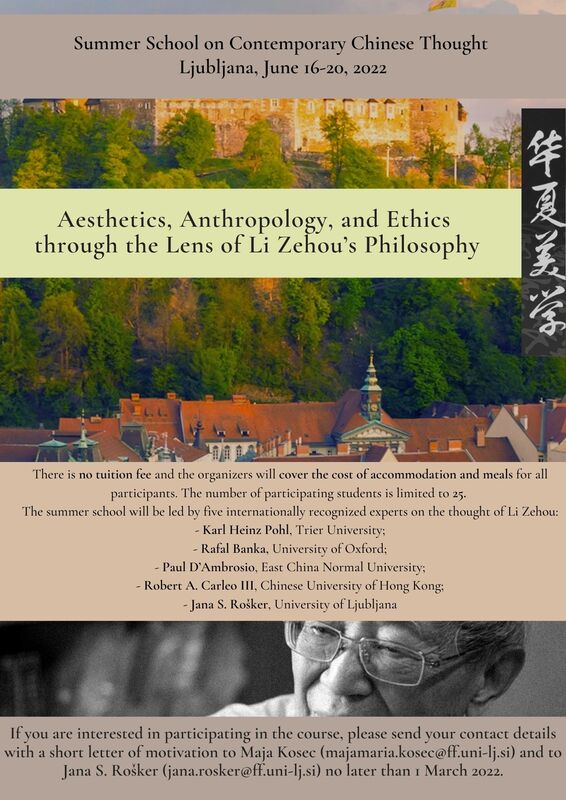|
Summer School on Contemporary Chinese Thought - Aesthetics, Anthropology, and Ethics through the Lens of Li Zehou’s Philosophy Ljubljana, June 16-20, 2022 We invite PhD students and post-docs from all European universities to participate in a four-day summer school on Li Zehou's system of thought. The rich intellectual legacy of Li Zehou, one of the most influential contemporary Chinese scholars, can help us understand the specific fusion of Western and traditional Chinese discourses that shaped contemporary Chinese society at the threshold of the third millennium. The summer school will take place at the University of Ljubljana from June 16-20, 2022, and is jointly organized by the Department of Asian Studies of this university and the European Association for Chinese Philosophy (EACP). There is no tuition fee and the organizers will cover the cost of accommodation and meals for all participants. The number of participating students is limited to 25. The summer school will be led by five internationally recognized experts on the thought of Li Zehou:
You will be notified about the acceptance no later than March 10 and we will send you the preparation material as well as the schedule of the course by the end of March. Brief description In early November 2021, Li Zehou, one of the giants of contemporary Chinese thought, passed away. Li Zehou was undoubtedly one of the most significant, important and influential Chinese philosophers and experts on Chinese culture of our time, and one of the few Chinese intellectuals whose works found a wide readership outside China. In the last two decades of the 20th century, he was a hero of Chinese youth and a role model for many Chinese intellectuals. His ideas had a tremendous impact on various areas of contemporary Chinese thought. Therefore, the main aim of this summer school is to introduce his important work to the youngest generation of European scholars in the field of Chinese studies and/or philosophy, and to provide them with a valuable insight into the structure of his thought and its main contents . Indeed, an insight into Li's intellectual system can help us understand the specific fusion of Western and traditional Chinese discourses that has shaped contemporary Chinese society on the threshold of the third millennium. He became famous in the 1980s with his works on Chinese aesthetics. In the creative urgency of that time, when aesthetics seemed to offer the most effective redemption from the difficult experiences of the Cultural Revolution, Li offered young Chinese new, extraordinarily creative interpretations of art, philosophy, and literature. Moreover, his theory of anthropohistorical ontology led several Chinese theorists to critically rethink the conformist version of Marxist epistemology and aesthetics. Li was also one of the first Chinese scholars to openly advocate a "rehabilitation" of Confucius as a representative symbol of Chinese intellectual heritage, and to call for a critical revival of Confucian thought. Countless debates on aesthetics, epistemology, ethics, or traditional Chinese thought have been inspired by Li Zehou's theories. In various intellectual, artistic, and cultural circles, his ideas were extensively cited as authoritative, and he became the intellectual icon or guru of many university students. In addition to his attempts to bridge various social dichotomies – individual freedom and social or historical necessity, alienation and progress, subjective emotions and objective laws – Li was seen primarily as a bridge between the older and younger generations of Chinese intellectuals. Despite the complexity and wide range of his works, which cannot be reduced to prevailing philosophical categories or currents, he is undoubtedly one of the most important modern scholars of Chinese history and culture, especially considering that his work was central to the Chinese Enlightenment of the 1980s. Li launched many new perspectives that had a great impact not only on Chinese but also on global theories of ethics, humanism, aesthetics, and philosophical anthropology. Li's popularity reached truly stupendous proportions. His books almost always sold out within a few days of publication, and there was hardly a dorm room that did not have at least one volume of his Critique of Critical Philosophy, even though the book was extremely complex and difficult to read. His enormous influence and appeal were felt by a whole generation of Chinese youth, who saw him as an inspiring intellectual leader comparable to Jean-Paul Sartre or Herbert Marcuse in Western culture. We can probably attribute this influence to two main reasons: Li's openly professed love of beauty, and his appreciation of freedom. These two ideals are still at the forefront of the intellectual and sensual aspirations of many young people around the world. Therefore, Li Zehou's thinking can undoubtedly contribute to a better understanding of his Chinese homeland, its society, and culture.
1 Comment
|
Archives
June 2023
Categories |


 RSS Feed
RSS Feed
